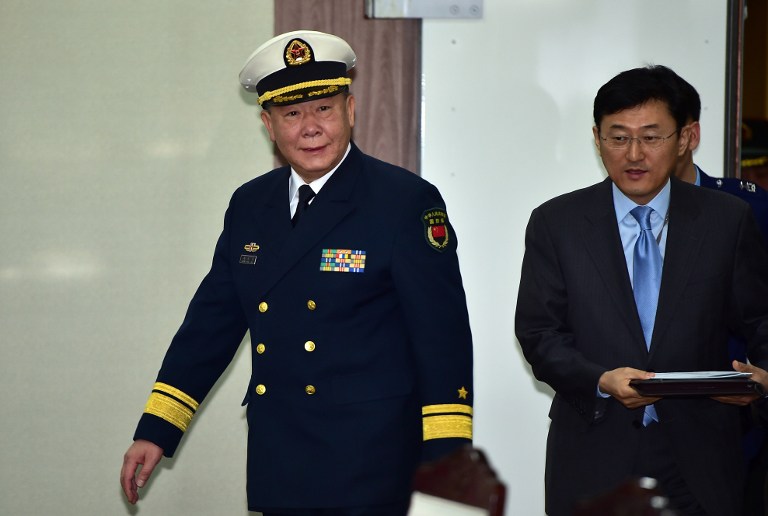China says it will ignore South China Sea lawsuit decision

Rear Adm. Guan Youfei (left), director of foreign affairs office of China’s national defense ministry, arrives to attend annual working-level talks with South Korea at the defense ministry in Seoul on Jan. 15. AFP
SINGAPORE—China said Saturday that it will ignore the decision of an international arbitration panel in the Philippines’ lawsuit against Beijing’s sweeping territorial claims in the South China Sea.
“To put it simply, the arbitration case actually has gone beyond the jurisdiction” of a UN arbitration panel, said Rear Adm. Guan Youfei, director of the foreign affairs office of China’s national defense ministry.
The Philippines has filed a case in the United Nations under the UN Convention on Law of the Sea, questioning China’s territorial claim in the South China Sea. An arbitration panel is expected to rule on the case soon. The Permanent Court of Arbitration ruled last year that it has jurisdiction over the case despite China’s rejection.
“Because the territorial and sovereignty disputes have not been subjected to the arbitration, we think the arbitration is illegal,” Guan told reporters on the sidelines of an international security conference here. “Therefore, we do not participate in it nor accept it.”
Guan’s statement is a reiteration of China’s longstanding position that it wants to settle its disputes with various countries on a bilateral basis and that it will not accept international mediation.
Still, it gains significance because of the overtures made by Philippine President-elect Rodrigo Duterte, who said recently that he is open to bilateral negotiations with China. This has given Beijing an opening that it hopes to leverage in the event the panel rules in favor of the Philippines. China also has conflicting claims in the sea with Taiwan, Indonesia, Vietnam and Brunei, who all are looking for US help, much to Beijing’s chagrin.
“The new Philippine leader also said that the Philippines hopes to conduct a dialogue with China,” Guan said. “We hope the Philippines could get back on to the track of dialogue. The door to dialogue is always open.”
Earlier Saturday, India’s defense minister told the conference, known as the Shangri-La Dialogue, that it is in China’s economic interest to reduce tensions in the South China Sea.
“It is ultimately economics,” Defense Minister Manohar Parrikar said. “If you have an unstable region like what we have in the Middle East, I don’t think economics and prosperity will really (be) enhanced.”
Although India is not a party to the South China Sea disputes, China is its traditional adversary. They fought a war in 1962, in which India lost land to China.
Parrikar said that however small or “however powerful” a country may be, “no commerce or commercial activity takes place in a highly tense (region). And I think it is in the interest of everyone, including China, to ensure that the peace remains in this region.”
Separately, Japanese Defense Minister Gen Nakatani said it was “getting increasingly important for all nations in the region to establish the order based on the rule of the law.”
Indirectly referring to China, he said that “powerful nations are required to act with self-restraint so as to avoid contingency.”
China claims virtually the entire South China Sea as its own, overlapping with territory claimed by other Southeast Asian governments. It has also started building airstrips on artificial islands it built on once-submerged reefs, much to the chagrin of the United States, which worries the buildup will impede freedom of navigation in the busy area.
The three-day Shangri-La Dialogue, which is being attended by defense ministers and experts from 25 countries, ends Sunday and covers topics that also include terrorism, cybercrime and North Korea’s nuclear ambitions.














